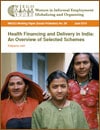Health Financing and Delivery in India: An Overview of Selected Schemes
This paper analyzes some of India’s most prominent heath insurance schemes from the perspective of poor informal women workers, a specific focus rising from the fact that women informal workers tend to have special needs and poorer health than their male counterparts.
The scheme differ in their structure and financing: the RSBY scheme, which is run by the Central Government; the Vimo SEWA scheme, which is the community-based health insurance scheme of the Self Employed Women’s Association (SEWA) that is now active in nine states in India; the Yeshasvini scheme in Karnataka, which works in collaboration with farmer cooperatives; and the Rajiv Aarogyasri scheme in the state of Andhra Pradesh.
The analysis focuses on five key aspects of the schemes: inclusiveness and access for informal workers; the quality of services being provided; awareness of the scheme among its intended beneficiaries; the scheme’s impact on reducing out-of-pocket expenditure on health care; and the scheme’s ability to provide access to women.
The paper shows that a range of institutional innovations are possible in terms of bridging the health equity divide.
View list of all: Working Papers

